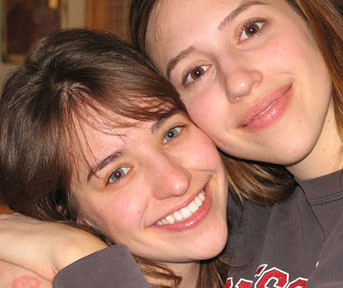Talk that talk
In recent years, I wouldn't have considered describing myself as a gullible sort of person. Growing up in suburbia did away with pretty much any sort of tendency I may have had to naively believe in anything that came my way. At this point you might be saying that if anything, that sort of setting should have made me more likely to accept anything without question, that under those circumstances if someone came up to me and told me there was nothing better in the world than the Santa Clarita Valley, I would have been brainwashed enough to believe this, but no, four years in high school and shopping at the local mall with a Charlotte Russe store in there showed me otherwise. Because it seemed impossible to believe that anyone would subject themselves to these things and still remain sane in the world, so I went through these formative years refusing to believe that these were the only things I had to look forward to in the world: peaking in high school and wearing a dress from Windsor Fashion to prom.
Then college was that time when, you know, the eye-opening education you're receiving is either supposed to shake your beliefs to their very core, or strengthen them, and then you emerge from this experience An Adult ready to face The World with a renewed Sense of Self and a self-assuredness in your step that wasn't there before, and a great interest in non-fiction books, e.e. cummings, and great French novels.
So ostensibly this is the state I find myself in now. A recent college graduate ready to tackle the world and show it who's boss. Which is why I'm so confused as to why I find myself accidentally believing things I really shouldn't be thinking twice about. Such as mistaking The Historian by Elizabeth Kostova for a piece of literary non-fiction writing.
I'm not sure if you're familiar with this book, but let me tell you what it's about: Dracula. And the point of the book is to let you know that Dracula, Vlad the Impaler, who died sometime in the 15th century, is still alive today. The author starts out the 909 page book describing research she did in the subject, which I mistook to mean that everything she is writing is non-fiction. After all, research = fact, right? So even after I read the following passage:
"The man had vanished; he had seen me see him. His face, between the awkward beard and new cap, had been indisputably a face from my university at home. I'd last looked at it just before it was covered by a sheet. It was the face of the dead library."
Even after I read that, that description of how the narrator saw a recently dead man walking around alive and well a few pages later, EVEN THEN, I just sat there nodding my head vigorously saying to myself "Yes! Completely likely! This man didn't actually die! He is still alive! I thought I saw someone like Thomas Jefferson walking down the street today, now I know how likely it is that he's still around!"
So it came as a big blow to learn that this piece of literature isn't actually non-fiction. It is about as fictional as Santa Claus and Charlotte's Web. Although the way things are going now, I get the feeling that this year is the year I will start believing in Santa Claus. I didn't when I was two, but now seems to be the time to start putting cookies out for him December 24th. So now I am left with reading 300 more pages of this book, and I am angry. I am angry because ever since learning this book is non-fiction, its writing has become significantly cheesier, and I have less patience than ever with the narrator's adventures waltzing through the south of France and Istanbul looking for a blood-sucking demon. And even though Hungary figures largely in the setting, the romanticized description of the people and the food nearly bring me to tears.
I am hell-bent on finishing this book now. I have dedicated too much time and effort to it. What I am left wondering, though, is HOW I could believe this was a piece of non-fiction writing. Has the ice-skating rink music I am subjected to every hour I am at work finally taking its toll? Does Sheryl Crow, Maroon 5, and Celine Dion on loop have this sort of effect on everyone, not just me? Because then I find this to be particularly disturbing. The museum would then be run by a group of people who would be looking for living dinosaurs in Central Park to put into cages, and would dedicate all their scientists to look for the Loch Ness monster.
Or is this recent character flaw simply a product of living in a city where I see insane things every day? A necessary lesson I have to learn to remember to keep my guard up at all times? This and other recent unfortunate events have taught me that perhaps it is best to be as skeptical about everyone and everything as I was in high school. The moral of the story is: be wary! Even if there are no vampires around to attack you.


